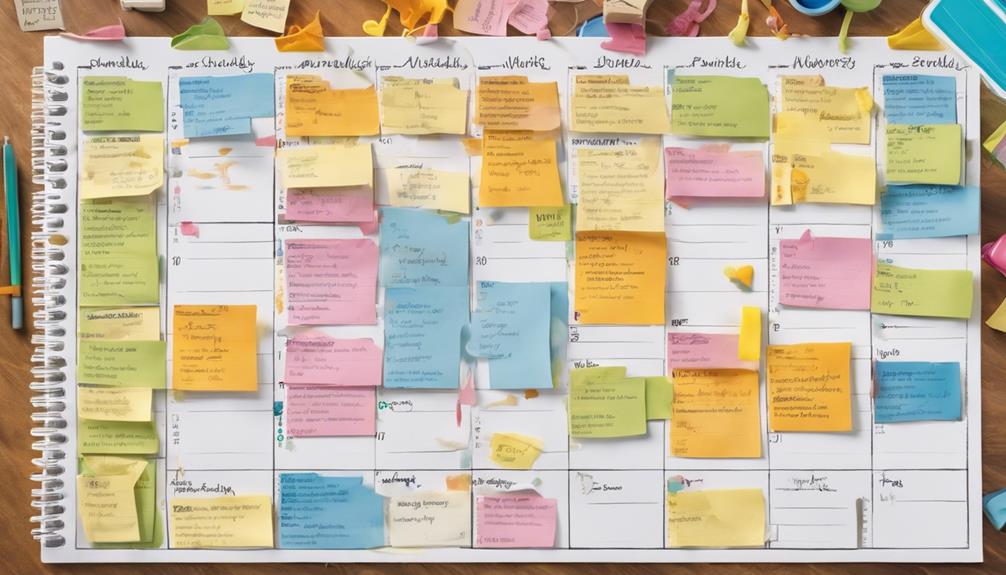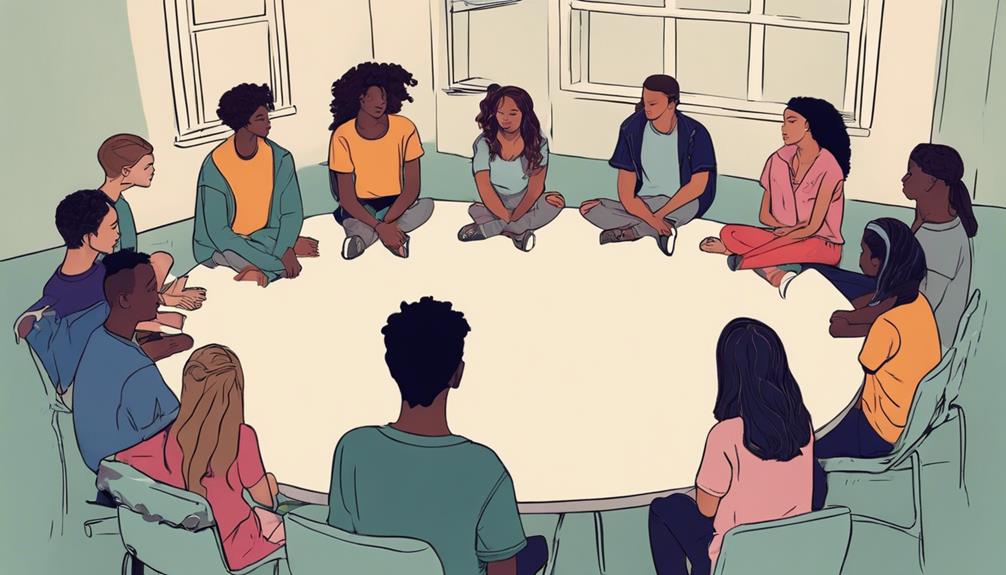Dealing with the complexities of divorce while living under the same roof can definitely be a challenging situation.
However, amidst the upheaval, there are practical strategies that can help us navigate this tumultuous time with grace and resilience.
From setting boundaries to managing emotions and fostering effective communication, this guide offers a roadmap to not only survive but thrive during this difficult transition.
So, how can we truly find peace and stability in the midst of such turmoil?
Key Takeaways
- Establish clear boundaries and designated personal spaces.
- Prioritize open communication and emotional validation.
- Create a new budget and address financial challenges.
- Develop a solid co-parenting schedule and share responsibilities effectively.
Setting Boundaries and Responsibilities
Let's designate specific rooms for each of us to maintain personal space and privacy as we navigate living together during this challenging time of divorce. Living separately within the same household can be difficult, but by allocating responsibilities for household tasks like cleaning and cooking, we can avoid conflicts and create a sense of order.
It's essential to establish clear boundaries on shared spaces such as the kitchen and bathroom to respect each other's personal space and promote harmony.
Communication is key during this transitional period. Let's communicate openly about relationship boundaries and expectations to prevent misunderstandings and foster mutual understanding. Setting up a schedule for using common areas will ensure that each person has designated time and space, reducing potential tensions.
Managing Emotions and Communication

Recognizing and validating emotions like sadness, anger, and confusion is crucial when managing emotions and communication during the divorce process. It's essential to be honest about how we feel and express these emotions in a healthy way.
Open communication with your ex-partner can help navigate through this challenging time. By following the truth and being respectful, conflicts can be minimized, making the process smoother for everyone involved.
Seeking support from friends, family, or support groups can also provide a safe space to express these emotions and cope with the challenges that come with ending a relationship. Co-parenting and ensuring the emotional well-being of children should be a top priority. Remember, they're also going through a tough time, and shielding them from unnecessary negativity is crucial.
Seeking legal advice and discussing financial arrangements, including shared expenses, can help alleviate some of the stress during this transitional period. Prioritizing open communication and emotional well-being can lead to a more amicable separation process.
Financial Planning and Budgeting
When facing divorce while living together, one of the crucial aspects to address is creating a new budget that considers separate expenses to effectively manage finances during this transitional period. It's essential to plan meticulously to ensure financial stability.
Post-divorce, single-parent families face significant financial challenges, with single-mother households earning about 25k/year and single-father households about 36k/year. To navigate this, make arrangements for ongoing expenses and household bills to prevent any financial turmoil.
Settling budgeting issues early with your ex can help avoid conflicts and uncertainties down the road. Keeping track of budget adherence is crucial; it allows you to make necessary adjustments promptly.
Co-parenting Strategies and Schedules

Establishing a clear co-parenting schedule is essential for fostering stability and reducing conflicts for children amidst the divorce process. Sharing parenting responsibilities effectively is key to promoting better outcomes for children's well-being post-divorce. Open communication about parenting arrangements is crucial for successful co-parenting. Considering shared residential parenting arrangements can help both parents stay involved in their children's lives. Seeking professional advice on co-parenting strategies can provide valuable insights and support during the divorce transition.
| Co-Parenting Strategies | Benefits |
|---|---|
| Establish a clear schedule | Fosters stability for children |
| Communicate openly | Reduces conflicts and misunderstandings |
| Consider shared residential parenting | Involves both parents in children's lives |
| Seek professional advice | Gain valuable insights and support |
| Prioritize children's well-being | Promotes a healthy post-divorce environment |
Self-care and Well-being Practices
To nurture our mental and emotional well-being during the challenges of divorce while living together, engaging in self-care practices is crucial. Amidst the complexities of this situation, it's essential to prioritize our own well-being.
Here are some strategies we can implement:
- Practice mindfulness meditation: Taking time for mindfulness meditation can help reduce stress and maintain emotional well-being as we navigate the divorce process.
- Engage in regular physical exercise: Incorporating physical exercise into our routine can boost our mood, reduce anxiety, and contribute to our overall well-being.
- Seek support: Whether from friends, family, or a therapist, seeking support can help us process our emotions and address the challenges of divorce while living together.
- Establish boundaries and open communication: Setting healthy boundaries and communicating openly with our ex-partner is crucial to safeguarding our well-being and promoting self-care.
Frequently Asked Questions
How Do You Survive a Divorce While Living Together?
We survive a divorce while living together by setting clear boundaries, communicating effectively, and prioritizing personal space. It's crucial to respect each other's needs, maintain financial transparency, and navigate this challenging time with empathy and understanding.
Who Is Better off Financially After Divorce?
We might think the one who leaves is better off financially post-divorce, but reality can surprise us. Both partners face challenges. Understanding finances, setting clear budgets, and open communication are key for a stable future.
Who Loses More Financially in a Divorce?
We both face financial losses after divorce, impacted by income, assets, and child custody. Women often bear more significant setbacks due to wage gaps and caregiving. Shared financial burdens and decreased income affect us both deeply.
How Many Years Does It Take to Financially Recover From Divorce?
It typically takes about 5 years for us to fully recover financially from divorce. Factors like children, employment, asset division, and alimony agreements can influence the timeline. Seeking financial guidance and planning can speed up the process.
How Can I Cope with Divorce While Still Living with My Spouse?
Living with a spouse while going through a divorce can be challenging, but there are ways to cope with divorce in this situation. Seek support from friends and family, establish boundaries with your spouse, and focus on self-care to navigate this difficult time. Finding healthy ways to cope with divorce can lead to a smoother transition.
Conclusion
In conclusion, navigating divorce while living together is no easy task, but with the right strategies and support, it's possible to create a respectful and harmonious environment.
Did you know that approximately 15% of divorcing couples continue to live together during the divorce process?
By setting boundaries, managing emotions, and practicing self-care, individuals can successfully cope with the challenges of cohabitating during divorce.
Remember, you aren't alone on this journey. Stay strong and prioritize your well-being.











